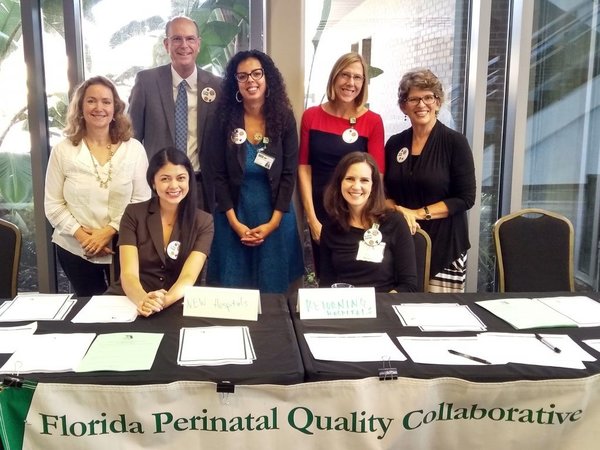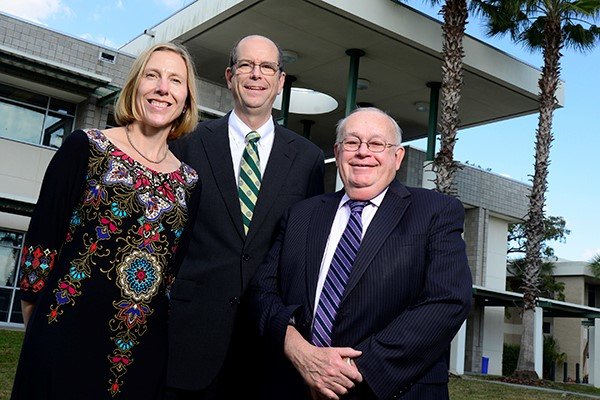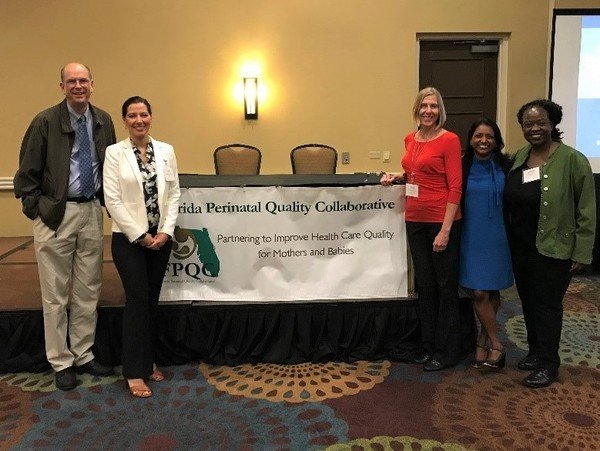Florida Perinatal Quality Collaborative celebrates 10 years of advancing the health of mothers and infants (VIDEO)
The Florida Perinatal Quality Collaborative (FPQC), housed in the USF College of Public Health’s Chiles Center, has been on a mission of making sure Florida’s infants and mothers receive the highest quality health care and outcomes for the last decade.
Some improvements hospitals have made because of the FPQC’s efforts include responding more quickly and appropriately to obstetrical hemorrhage and acute hypertension, reducing unnecessary early term deliveries and cesarean deliveries to low risk women, and delivering more appropriate identification and care for mothers using opioids and their infants.
And, their list of quality improvement initiatives across the state goes on.

“Collaboration is key,” said Dr. William Sappenfield, USF COPH professor and director of the FPQC and Chiles Center. “FPQC only works through collaborations with others. I think of the FPQC as a car. Our leaders, hospitals and partners decide where we are going, how we get there and who is going with us. We just facilitate the journey.”
Sappenfield co-founded the FPQC alongside Dr. John Curran, an influential pediatrician, retired professor of pediatrics, and former associate vice president of USF Health and senior executive associate for the faculty and academic affairs at USF Health Morsani College of Medicine.
Because of its collaborative partnerships with health professionals, policymakers, hospitals, advocates, individuals and organizations, the FPQC has continued to expand its reach of advancing the health and well-being of Florida’s mothers and infants since its inception ten years ago, according to Sappenfield.

“We have more partners, more volunteer leaders, more funding, more initiatives, more participating hospitals and more results,” he said. “We have grown from six hospitals in our first pilot initiative to now supporting three quality improvement initiatives with 80 participating hospitals that serve 86 percent of mothers and babies in the state.”
The FPQC and their partners have been working on numerous data-driven, population-based, quality improvement projects focused on some of the most critical perinatal health issues in Florida.
Led by a steering committee and a leadership team, the FPQC engages its stakeholders to identify the priority perinatal quality improvement issues and to determine which initiatives are appropriate, feasible, engaging, measurable and supportable. Much of the FPQC’s work is possible through continuous funding and support from the Florida Department of Health.
“It is all about results; measurable improvements in health care and outcomes,” Sappenfield said.
The FPQC also holds an annual conference each year that draws hundreds of attendees from across the state from a variety of disciplines. The two-day educational program is intended to expand the knowledge and skill base for perinatal health-care practitioners and identify future quality improvement opportunities and collaborations.
Dr. Maya Balakrishnan, associate professor of Pediatrics at USF Health, joined USF’s Division of Neonatology in 2010, just as the FPQC was forming, and eventually became FPQC’s director of quality in 2013 before advancing to associate director for clinical and quality management in 2016.
She guides teams in the use of quality improvement methodology and has worked with Tampa General Hospital to facilitate workshops across Florida.
“FPQC has blossomed under the leadership of Dr. Sappenfield, whose work here embodies our vision of partnering to improve health care quality of mothers and babies in Florida,” she said. “He took the framework and foundation that Dr. Curran built and collaborated with community leaders, state agencies, and other state perinatal quality collaboratives. He has increased our capacity and capability to make positive changes to the health care that we provide by supporting use of evidence based, data-driven practices and quality improvement methodology.”
She said collaboration of community partners, state agency stakeholders and other perinatal quality collaboratives is a major asset of the FPQC.

“By working together as a state perinatal quality collaborative, we are making a population-level impact,” Balakrishnan said. “Our focus on teamwork both internally and with our partners around the state serve our mission. Our efforts have positioned us to have Florida [rank] number one in states addressing health outcomes for mothers and babies.”
She said the FPQC has stayed true to its mission of improving the lives of mothers and infants in Florida by helping hospitals and health care providers to focus on quality and patient safety.
“Being part of FPQC has been one of the most rewarding experiences in my professional career,” she said. “As we implement maternal and infant health initiatives, the FPQC has successfully collaborated with community partners and state agencies. This has broadened our reach throughout Florida and brought us innumerable opportunities to further our mission.”

Dr. Judette Louis, chair of the USF Morsani College of Medicine Obstetrics and Gynecology and USF COPH associate professor, has been involved with the FPQC since 2013 and has served as a clinical lead for the hypertension in pregnancy initiative, as well as the obstetric hemorrhage initiative. She’s also currently participating in the maternal opioid recovery effort initiative.
“In the beginning our efforts centered around convincing members of the communities of the importance of this concept,” she said. “Not only are they now convinced, they seek us out for leadership and guidance. We have grown in influence when it comes to perinatal safety and quality.”

She said the collaboration of the FPQC with statewide partnerships has resulted in more comprehensive and effective initiatives.
“We bring one aspect of the situation to the table. However, we know that health care is a lot more complex. Our partners provide that knowledge of how to navigate patient, provider and systems challenges. They bring solutions to the table,” she said. “I am proud of the fact that they continue to grow in influence and impact change. Even when it gets hard, the FPQC pivots and continues to work hard to achieve their goal of healthy moms and babies.”
Story by Anna Mayor, USF College of Public Health
